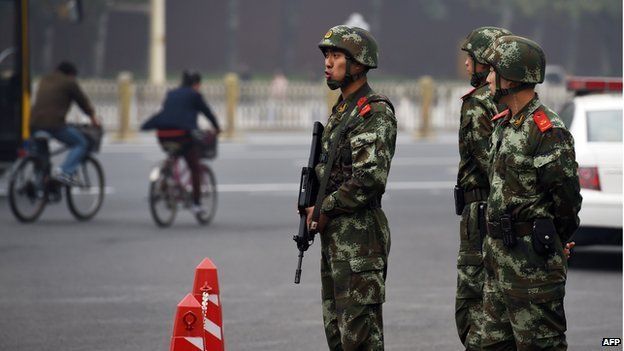China media back anti-corruption drive
- Published

Media welcome the ruling Chinese Communist Party's (CPC) pledge to create a law-based society made at a key meeting this week.
At the annual Central Committee plenum that ended on Thursday, the party's leaders promised "sweeping judicial reforms while hailing the overarching role of the constitution in the country's legal system", the Xinhua news agency reports.
It adds that the meeting adopted a "carefully-worded communique" which stated that legal reforms would be aimed at "giving judges more independence and limiting local officials' influence over courts and cases".
Ma Huaide, vice-president of the China University of Political Science and Law, tells the news agency that this is the first time that the party has adopted a document that "explicitly bans officials from meddling in judicial cases and vows to hold violators accountable".
In another article, Xinhua describes the meeting as a "milestone" and highlights the party's role in establishing the rule of law.
"The people can be their own masters and life in the country can become law-based only when we have the leadership of the party [in charge] of fully implementing rule-based governance," it argues.
The People's Daily gives prominent coverage to the meeting and publishes several articles praising the communique as "uplifting, encouraging and full of surprises".
A commentary in the paper calls for the rule of law to become a "national value".
The English-language China Daily notes that the plenum's decisions " to base the country's major policy making on law" would "give full play to the judiciary" and build "a mechanism that cages power".
"Citizens with a strong sense of rule of law will act as deterrent to corruption in the Party and the government. And a clean and strong Party will better protect the rights of citizens and help take the country toward greater prosperity," concludes the China Daily.
The CPC meeting endorsed prior decisions to expel six former officials from the party, including three central committee members, that were investigated for graft.
Several reports, however, note that the plenum did not discuss the fate of China's former domestic security chief Zhou Yongkang who is also being probed for corruption.
Analysts tell Hong Kong's South China Morning Post that the "lack of action on Zhou Yongkang suggests party divisions".
According to Hong Kong-based political commentator Johnny Lau Yui-siu, reforms by President Xi Jinping are facing "strong resistance" within the party.
A commentary in the Haiwai Net also observes that no mention was made at the meeting of top military official Xu Caihou who has been accused of accepting bribes.
"Mr Zhou and Mr Xu are at the centre of the corruption theme, yet there wasn't much discussion about them during the meeting," says the article.
Nevertheless, it adds that the anti-corruption effort of the current leadership has won much praise and dismisses allegations of "power struggles" within the party.
Dalai Lama
Moving on to other news, some media highlight the current visit of the Tibetan spiritual leader to North America.
The Dalai Lama started his three-week tour in Canada on Monday, and is due to arrive in the US on Friday.
The Global Times notes that he will not be meeting any politicians in both countries.
Experts interviewed by the paper say that the visit "will not have any political influence" on the Asia-Pacific Economic Cooperation (APEC) summit held in Beijing next month.
"Western countries have been very cautious in meeting with the Dalai Lama in the past three or four years, and there's no chance that he could accomplish any of his political demands," says Niu Xinchun, an expert at the China Institutes of Contemporary International Relations.
The pundit explains that the international community "will not risk relations or economic ties with China to support the Dalai Lama as China's economic and political status is rising worldwide".
"The world now focuses more on China's economic growth and comprehensive power rather than the Tibet issue and the Dalai Lama," Shao Yuqun, an expert on American affairs at the Shanghai Institutes for International Studies, tells the Global Times.
Zuckerberg in China
And finally, papers comment on Facebook founder Mark Zuckerberg's attempt to woo Chinese students by conducting a 30-minute question-and-answer session in Mandarin.
Mr Zuckerberg was in Beijing as a newly appointed member of the advisory board for Tsinghua University School of Economics and Management.
Responding to Mr Zuckerberg's positive remarks on China, the Beijing Times notes that Apple CEO Tim Cook has also made similar comments.
"It is difficult to tell if their love for China and the people is real, but what is beyond all doubt is their love for China's big slice of cake comes truly from the bottom of their hearts," quips the daily.
BBC Monitoring reports and analyses news from TV, radio, web and print media around the world. For more reports from BBC Monitoring, click here. You can follow BBC Monitoring on Twitter and Facebook.